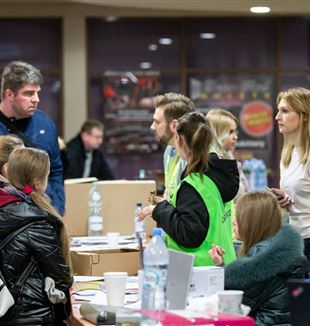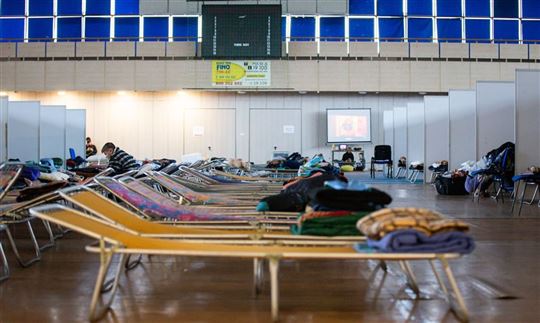
Poland: “Our lives belong to each other”
They arrive at all hours, day and night, and someone is there waiting for them. What do those who welcome people fleeing war see? From the April issue of Traces, voices of the Polish CL community, immersed in the river of refugees.Krakow’s central station has become an enormous human river. The trains arriving from Ukraine unload women, children, and old people on the platform at every hour of the day and night. Since the beginning of the conflict, over two million refugees have crossed the Polish border and moved on to the big cities of Warsaw, Lublin, Czestochowa, Wroclaw, and others.
The Polish government passed in record time a special law to facilitate their integration. Not only does it provide ten euros a day to each family who hosts them, but it also simplifies the procedures for school enrollment for minors, rent contracts, and hiring, while ensuring cost-free movement throughout the nation. This law sought to support the extraordinary actions of the many Polish people who right from the beginning opened their homes and offered meals, car transportation, and jobs to the refugees. Over a hundred thousand volunteers have gone to the borders or train stations to help Ukrainian families find lodging or continue their journeys. They can be recognized as they move among the train platforms and tents by their yellow vests with the word “help” in Cyrillic written on them. They are common people, of all ages and with no special skills, but with a desire to throw themselves into this uninterrupted flow of lives arriving from Ukraine.
Among them is Anna, a 58-year-old woman, who by profession is an icon painter. The first time she went to the Krakow station was to accompany her 20-year-old daughter, Maria. “OK, I’ll come with you for two hours,” she had said one evening, only to remain there the whole night. It was the first of many. “You can’t help but return the next day. The need is too great,” Anna recounts. At night everything is more complicated, both logistically and emotionally: it is difficult to find car rides or lodging, and the people’s souls experience dark moments. One night Anna welcomed an elderly woman who was all alone. She accompanied her to a table in the cafeteria while she waited for someone from the Facebook page activated to manage requests to find a bed for her. Anna held her hand and reassured her, trying to use words common to Polish and Ukrainian. “Then, just before they came to bring her to a hotel, she said to me, ‘Anna, don’t leave me, you are the only friend I have in this foreign land.’ In those few minutes a total trust was born.” This happened to a Ukrainian woman who asked help buying a ticket for Paris. Unable to make heads or tails of the railway website, she handed Anna her credit card. “You do it,” she said. “And then she discovered that, as happens to many, her bank accounts were empty because of the devaluation of the Ukrainian currency. The volunteers, when possible, pay for the tickets to other countries,” Anna explains.
The foreign TV services are very interested in recounting what is happening among the Polish volunteers and Ukrainian refugees, in part because the history of these two peoples has been marked by clashes that still burn in the memory of the older people. Anna’s family comes from the area of Lviv, which until 80 years ago was Polish territory. Her father, at that time a child, fled in the nick of time from the slaughter wrought by the Ukrainians. A journalist asked her, “Why are you helping these people?” and she replied, “Because I don’t want anybody else in the world to suffer what my father suffered.”
Today Krakow is full. Everything that could be converted into shelter for refugees has been converted: malls, gyms, parishes, and old hospitals are full to overflowing, and they have begun filling the hotels far from the city. Now the Ukrainians are being sent to hotels on the Baltic Sea coast and the bed and breakfasts in the mountains.
The city of Wroclaw is the furthest from the Ukrainian border, but many refugees have found a place there. Jacek and his wife Ola have offered a room in their apartment for Olena, who fled with her daughter Emilia. He cannot call them refugees because for him they are friends. “We are one family. Emilia attends the nursery school of our son and we are looking for a steady job for Olena,” Jacek recounts. Every evening they call Olena’s husband, Slava, who remained in Lviv. He in turn has given hospitality to some people from Kiev. “In the evening during the video call they join in too: we look each other in the eyes and see this pain, but feel that there is more than this. Mysteriously our lives have crossed and now they belong to each other. We are signs for each other. This becomes a source of hope, and hope gives us courage.”
In the small CL community in Wroclaw, other families have done the same. On Sundays, when they meet with their Fraternity group, they invite their guests as well. “We sang our songs, beginning with Povera voce and Only Our Rivers Run Free because it seemed like the most direct way to communicate with them. Then we read the CL note on the war, and concluded with lunch together.” Returning home, Jacek’s wife Ola asked Olena if she was tired. “No, it was beautiful. I feel loved, even if my life now is so fragile.”
The day the Russian tanks invaded Ukraine, Joanna went to her school in Krakow and asked her classmates and teacher, “Why do we study, if we don’t know whether it’ll be useful? If we don’t know whether there will be a future?” None of the answers calmed her fear. In the following days she participated in the rosaries prayed during the break, and went with her CL friends to the Krakow stadium to lend a hand with the clothing collection. But nothing changed in her until she met Tatiana and her 13-year-old niece Ruslan, two Ukrainians whom Joanna’s parents decided to host in their home. In the beginning she felt very uncomfortable with them, but then one afternoon when she returned home, she found Tatiana intent on preparing dinner for the whole family. “Welcome home, Joanna, we missed you today!” she said to her. “All of a sudden, I felt loved for no reason, because I had given them nothing.” Then she became aware of Ruslan’s desire to return to the classroom. “I stopped complaining every morning and
grouching about tests.”
One evening Joanna decided to go to the train station to help. She had been vacillating for weeks. But having Tatiana and Ruslan in their home gave her the courage to jump in. She was set to work distributing food. “I held out the bags and just said ‘here you are’ in Ukrainian. I’ve never heard ‘thank you’ said so many times,” she recounts. “And I’ll never forget the faces of the people I accompanied to the room with cots. Children simply happy to be able to go to sleep. I returned home tired but happy. Papa told me I’d done what my heart wanted from the very beginning.”
Read also - Ukraine: Staying human
Dagmara lives in a village near Wroclaw. Married and the mother of two children, she is the beating heart of the CL community in Poland, taking care of the secretariat and communications. Since the war began, she has received many phone requests for help. As the days passed, total strangers became names and faces to seek out, to find rides and beds for. “In Poland it’s something we are all doing. I’m very proud of my people, but I realize, watching TV, that there’s a lot of sensationalism around this. I feel the need to go to the heart of these gestures of charity.” She recounts that a few days before the invasion, a priest friend had asked her to prepare a testimony for a course for engaged couples. “I had jotted down a few notes, but then the war started and it seemed like the testimony had become the lowest priority thing to do.” She was tempted to call the priest and tell him she wanted to drop it, but then, reflecting on the story of her marriage, she became aware of God’s faithfulness. “Every wearisome effort, every step was sustained by the continual reoccurrence of His presence. Here is my hope today. In the evening, when I pray with the children, I ask for this hope for the whole world.”